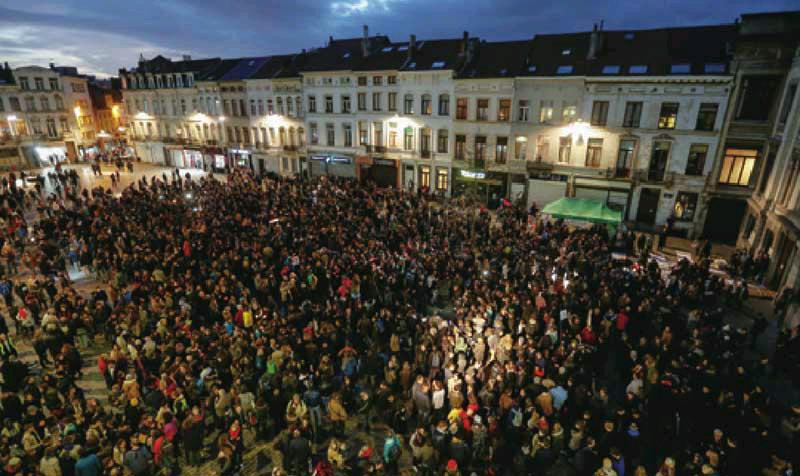Better Together?
2016-04-13ByYuLintao
By+Yu+Lintao
Shortly after the fatal bomb attacks in Brussels, the capital of Belgium and the heart of the EU on March 22, Belgian Prime Minister Charles Michel told the public,“What we feared has happened.” For weeks, intelligence agencies had warned of the possibility of a large-scale terrorist attack on the European continent, saying that it was only a matter of time.
The recent attacks killed at least 35 people and injured several hundreds more. The terrorists were not just targeting the Belgian Government, but aimed to at least symbolically inflict damage on the European establishment. At the time of writing, at least two suspects are still at large.
Less than five months ago, deadly blasts rocked Paris, France, claiming more than 130 peoples lives. The March 18 arrest in Brussels of the fugitive and French national Salah Abdeslam, the only known surviving suspect of the November Paris attacks—after a four month manhunt—neither deterred, nor prevented the attacks from happening in the same city just four days later.
Afterward, U.S.-based terrorism expert Paul Cruickshank said of the terrorist network becoming increasingly prevalent in the EU,“Theres a spider web, an intricate spider web stretching through Europe. The center of that spider web is Brussels.”
To be sure, the so-called “Islamic State” (ISIS) extremist group, which claimed responsibility for the above attacks, sees Europe as an enemy. While the United States may also be a target, perhaps the United States is too far away, or logistically, attacks on Europe by people already there were more feasible.
U.S. intelligence agencies estimate that at least 5,000 European-born Muslims have been to Syria or Iraq to participate in terrorist training exercises, many of whom have since gone back to Europe. In testimony to a U.S. Congressional committee, NATO Commander in Chief and U.S. Air Force General Philip M. Breedlove estimated that among the millions of migrants arriving in European countries as part of the massive refugee influx—caused in part by the war and subsequent humanitarian crisis in Syria—at least 1,500 have been trained as terrorists.
The capabilities of potential terrorists should not be underestimated. The series of bombings from Paris to Brussels have already shown ISISs capacity for bloodshed. They have also highlighted Europes security loopholes.
After the Brussels attacks, European countries once again stepped up antiterrorism measures. In the Netherlands, Belgiums neighbor to the north, border controls were tightened and trains to and from the country were suspended. Security patrols were reinforced in the main airports serving the Paris metropolitan area. German police increased security on the borders with Belgium, France, the Netherlands and Luxembourg, as well as in domestic airports and railway stations. In fact, security measures have been beefed up in almost all European countries, including Scandinavian countries like Norway and Finland.
Despite the measures European authorities have made to restore peoples confidence in security on the continent, the repeated terrorist attacks have already cast a long shadow. The casualties at home have forced Europeans to understand that the fight against terrorism is no longer taking place in a faraway land. Against this backdrop, Europes immigration policies are experiencing renewed scrutiny, and the traditional Western values of taking in political and humanitarian refugees may find itself threatened.
National politics in some major European countries have taken a turn to the right, and the recent bombings may accelerate the rising trend of nativism being championed by right-wing parties there. Unfortunately, the rise of terrorism has coincided with the rise in immigration, making a convenient excuse for those whose political agenda it suits.
In local elections, some have voiced their concerns over their countries policies of taking in Middle Eastern refugees, with French President Fran?ois Hollandes Socialist Party and German Chancellor Angela Merkels Christian Democratic Union both suffering recent losses. Meanwhile, farright parties, such as Frances National Front, enjoyed a relatively strong performance in the latest election.
The Brussels attacks may weaken the pro-EU argument in the United Kingdom amid security fears. The attacks in Brussels came just months before the UK will vote in a referendum on whether or not to stay in the EU, an event scheduled for June 23. Since the Paris incident, pro-Europe officials and supporters in the UK feared that another terrorist event in Europe could severely damage their campaign to stay in the EU.
Actually, within an hour of the first attack in Belgium, the far-right UK Independence Party issued a press release linking the attacks to the EUs immigration policies and the Schengen passport-free zone, though others responded that the Schengen Agreement has played a fundamental role in promoting European integration.
Under the agreement, member countries have promoted the free movement of people, which is seen as a major factor in propelling the continued prosperity of the EU. However, due to the terrorist threat, and the wave of immigrants that has received a mixed response from the blocs members, some EU states are now rebuilding “walls”via increased border controls. The Schengen Agreement is thus in an awkward position moving forward.
Perhaps most worrying is that Europes inclusiveness may be diminishing. Europe, which is still recovering from the worst economic recession in decades, is now prioritizing security. Fueled by the now frequent occasion of terrorist attacks carried out by religious extremists, some European countries, which traditionally championed diversity, are now less willing to accept refugees from the Middle East—the majority of whom are Muslim.
Europes dream of pan-continental integration is also a victim of the terrorism sprees. The attacks are shaking the foundations of Europe, and throwing its security, continued development and cohesive existence into question.
